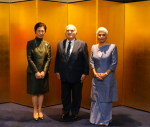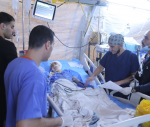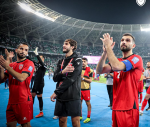You are here
United with Putin against terror?
Nov 22,2015 - Last updated at Nov 22,2015
Russian President Vladimir Putin has just vowed to “find and punish” those responsible for using a homemade bomb to bring down a Russian airliner over Egypt in October, killing 224 people.
The timing of his announcement, just days after terrorists used suicide bombs and Kalashnikovs to kill 129 people in Paris, is no coincidence.
Putin sees an opening to the West, and he wants to take advantage of it. The West should not shut him out.
For weeks, the Russian government seemed to be dithering over the proper response to the plane crash, as if it were worried that the loss of life would be blamed on its decision to intervene in Syria’s civil war.
The bloodshed in France, however, has changed the calculus completely, pointing towards the possibility of a rapprochement between Russia and the West.
By striking Paris, Daesh has turned the Syrian war into a global conflict. And, as Putin’s performance at the G-20 summit in Turkey showed, Russia is firmly in the middle of the fight.
It must be noted that an adversarial relationship with the West was not part of Putin’s original plan.
“Russia is part of European culture,” Putin told the BBC in 2000, shortly before his election as president.
“I cannot imagine my own country in isolation from Europe and what we often call the civilised world. It is hard for me to visualise NATO as an enemy.”
It was only in 2002, after NATO began talks to admit Bulgaria, Estonia, Latvia, Lithuania, Romania, Slovakia and Slovenia that relations began to sour.
As former British prime minister Tony Blair described the turning point in his memoirs, “Vladimir later came to believe that the Americans did not give him his due place”.
Putin’s bellicosity was later reinforced by domestic political concerns — a deep recession that made it necessary to channel voters’ anger — and perceived slights, especially at the hands of the United States (President Barack Obama once referred to Putin as “the bored kid in the back of the classroom”).
But it was only with Russia’s intervention in Ukraine and its annexation of Crimea in March 2014 that Putin became openly confrontational, portraying his country as the victim of aggression.
The West has “lied to us many times, made decisions behind our backs, placed before us a fait accompli”, Putin said in a televised address, shortly after a dubious referendum in Crimea cemented Russia’s control over the region.
“This happened with NATO’s expansion to the East, and the deployment of military infrastructure at our borders.”
Putin has since appeared to be responding to Obama’s description of Russia as merely a “regional power” by attempting to demonstrate the Kremlin’s ability to act globally — most notably by intervening in Syria.
At the G-20 summit in Turkey, however, Putin struck a markedly different tone, extending an open hand: “We proposed cooperation on antiterrorism; unfortunately our partners in the United States in the initial stage responded with a refusal…. [But now] it seems to me that everyone is coming around to the realisation that we can wage an effective fight only together…. If our partners think the time has come to change our relations, then we will welcome that.”
The logic behind Putin’s overtures is clear.
Russia has achieved its objective in Ukraine: a frozen conflict that will provide the Kremlin a continuous role in the country’s politics. His goal now is to convince the West to lift its sanctions.
As analysts at Stratfor Global Intelligence put it, “unless the Kremlin is willing to let Russian companies default on their debts or make bigger cuts to their current operations or future investments in the coming years, Moscow will need to convince the Europeans to let at least the harshest sanctions expire”.
The attacks in Paris have provided Putin with the opportunity to present his military operations in Syria as a service to the West, an example of Russia’s willingness to perform the dirty work of attacking Daesh in its own territory.
And Putin is already making concessions in the diplomatic sphere.
At a summit in Vienna on November 15, just two days after the attacks in Paris, Russia and the US seemed to set aside some of their differences on how to end Syria’s civil war, agreeing to a timeline in which a new government would be elected in early 2017.
The US and its European allies have suddenly gained a great deal of leverage over the Kremlin, and they should not be shy about using it.
While the West should not be quick to lift its sanctions — the dispute over Crimea is unlikely to be resolved quickly — harnessing the Kremlin’s desire to be recognised as a great, global power is a sound strategy.
The frozen conflict in eastern Ukraine can be thawed if Russia is convinced to observe the Minsk Protocol, withdraw its troops from the border, and help facilitate local elections under international standards.
If Putin is willing to create some goodwill by cooperating in Ukraine, the West should consider offering some small concessions in return.
Russia’s participation in the battle against Daesh — and its return to the rule-abiding ranks of the international community — may be worth the price.
The writer is professor of international affairs and associate dean for academic affairs at The New School and a senior fellow at the World Policy Institute. ©Project Syndicate, 2015. www.project-syndicate.org












